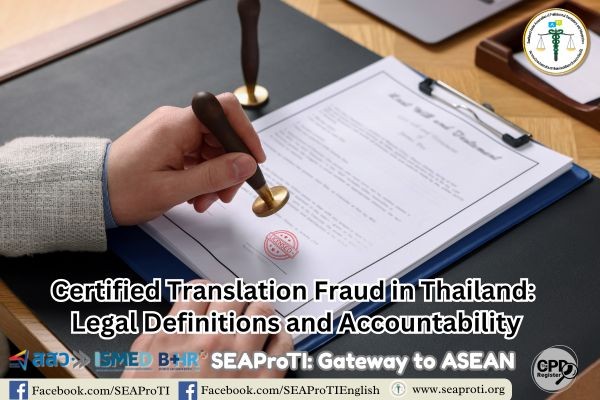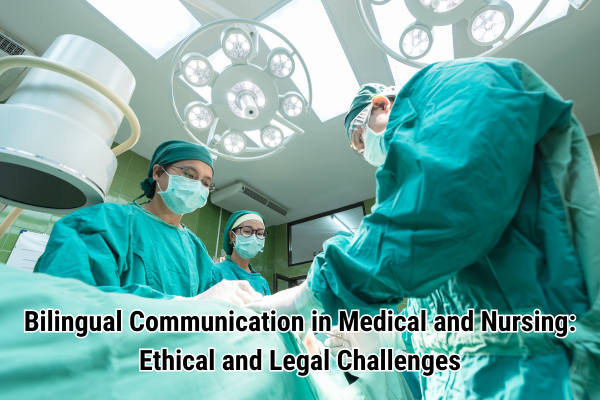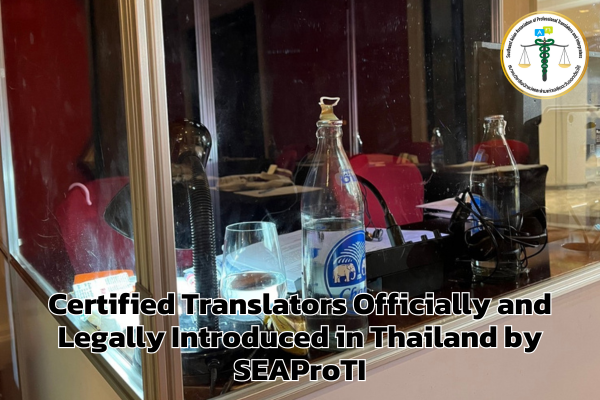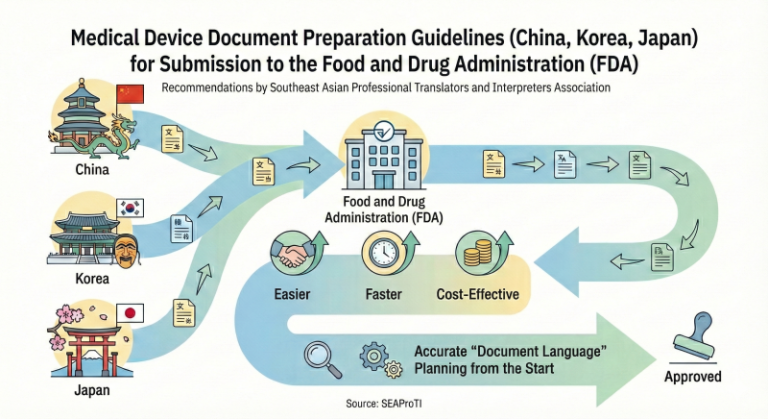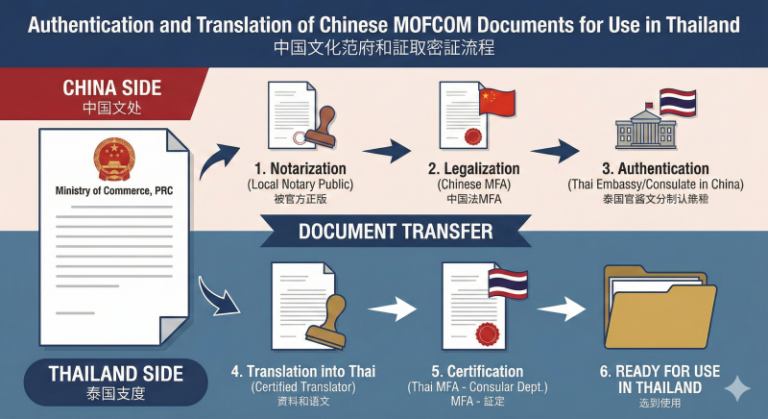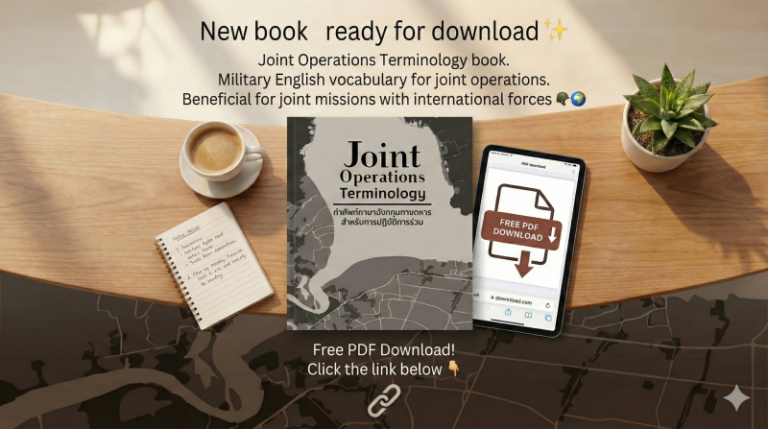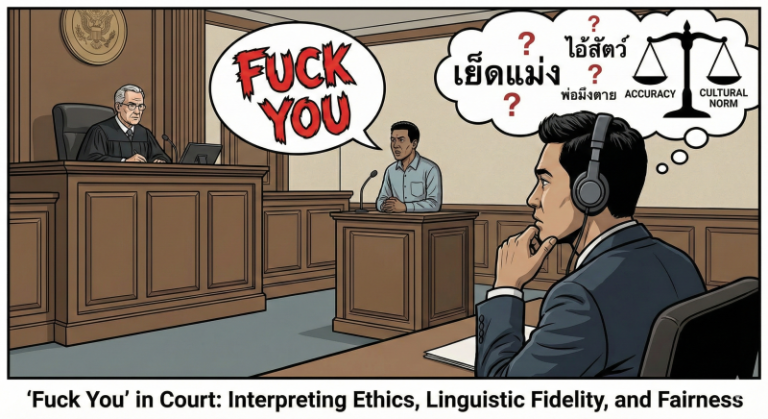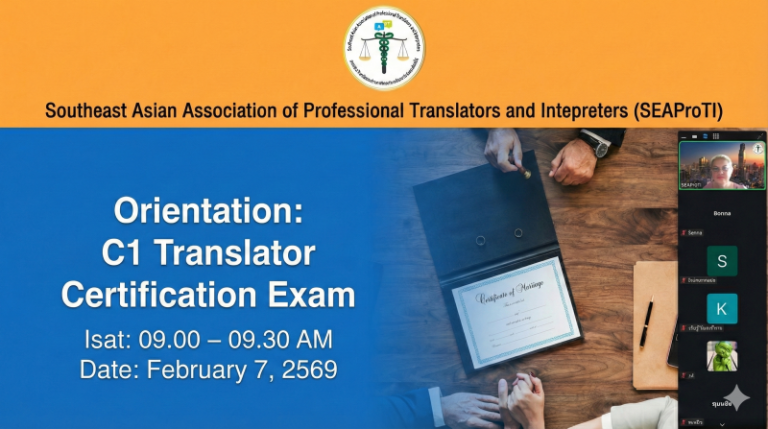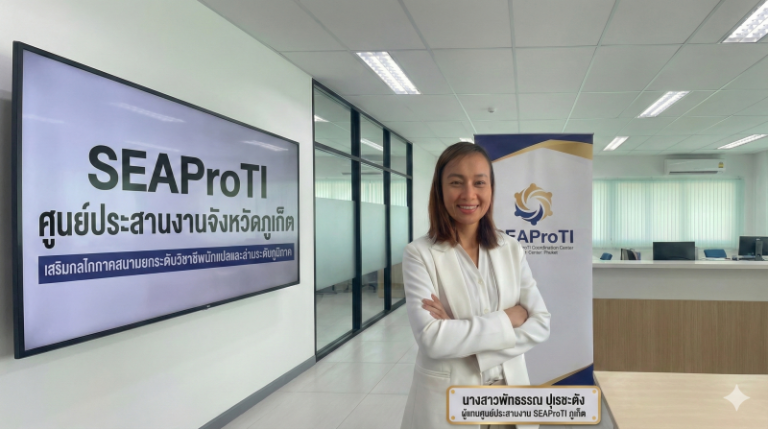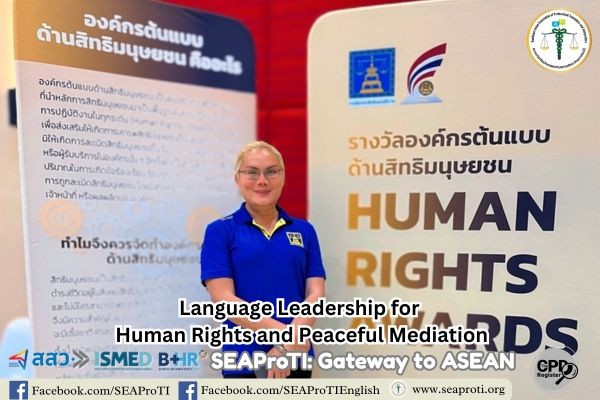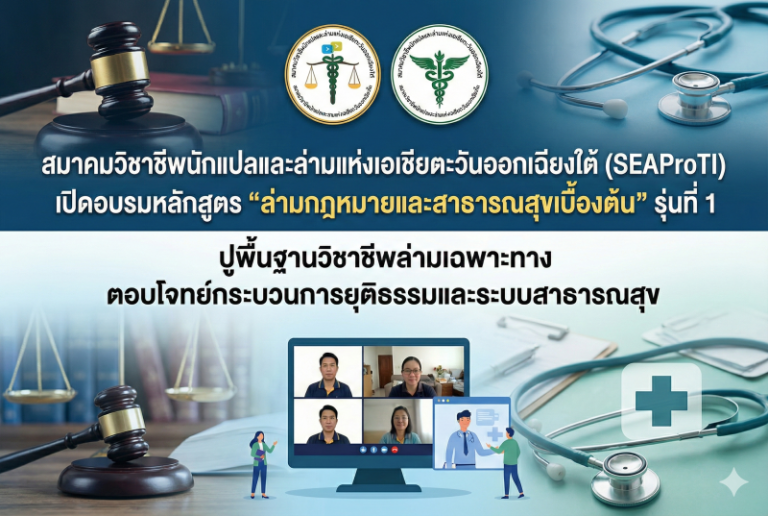Certified Translation Misconceptions in Thailand:
Legal Recognition, Professional Standards, and Translation Fraud
20 October 2025, Bangkok – The concept of “certified translation” in Thailand is widely misunderstood, leading to systemic confusion and consumer deception. This article examines the legal framework governing certified translations, the distinction between professional and legally authorized translators, and the implications of unauthorized certification practices that constitute translation fraud under Thai law. The study draws upon SEAProTI’s regulatory framework and recent government recognition to clarify the standards and accountability mechanisms that define legitimate certified translation.
1. Introduction
In Thailand, translation is not merely a linguistic act but a legal instrument in administrative, judicial, and international processes. However, public misunderstanding persists when translation agencies or freelancers claim to provide “certified translations” without legal authorization. Such practices not only mislead consumers but also undermine the legitimacy of genuine certified translators registered with recognized professional associations.
2. Legal Definition of Certified Translation
A certified translation (เอกสารแปลรับรอง) refers to a document that has been translated and officially attested as accurate by a translator authorized under Thai law or recognized by a registered professional body.
The Southeast Asian Association of Professional Translators and Interpreters (SEAProTI)—officially published in the Royal Gazette, Volume 141, Part 66 Ng, page 100 (25 July 2024)—defines the categories of Certified Translators, Translation Certification Providers, and Certified Interpreters as recognized professional roles with legal authority to certify translations.
Moreover, the Council of State of Thailand, in its official letter to SEAProTI dated 28 April 2025, endorsed the proposal for a Royal Decree granting certified translators and recognized certification providers from professional associations or accredited institutions the legal authority to certify translations.
3. The Problem of Unauthorized Certification
Many translation agencies and online platforms in Thailand falsely advertise “certified translations” as services performed by “professional translators” who merely attest that the translation is accurate. In reality, such individuals or entities lack the legal status to issue certification, which must originate from a SEAProTI-registered Certified Translator or a recognized institution.
This practice constitutes a form of translation scam, as it misrepresents professional qualifications and may lead to the rejection of documents by embassies, courts, and government agencies. In some cases, it may also violate the Consumer Protection Act (B.E. 2522) and Section 341 of the Thai Penal Code (Fraud), due to the deliberate deception of clients regarding the legal validity of certified translations.
4. Professional Standards and Ethical Accountability
SEAProTI’s peer-certification system establishes clear standards for competence, ethics, and accountability among certified translators. Members undergo assessment, annual renewal, and compliance checks with the SEAProTI Code of Ethics, which emphasizes:
- Accuracy and Fidelity: Translations must reflect the meaning and intent of the original text.
- Confidentiality: Protecting the privacy and security of client information.
- Impartiality and Integrity: Avoiding conflicts of interest and misrepresentation of credentials.
- Professional Responsibility: Using the title “Certified Translator” only when duly registered and authorized.
These principles differentiate legitimate certified translators from unqualified providers who exploit public ignorance to issue false certifications.
5. Legal and Ethical Implications
Unauthorized certification not only jeopardizes the validity of documents but may also cause legal consequences for clients. A translation lacking lawful certification can be rejected by courts, embassies, or educational institutions, potentially delaying legal proceedings, visa applications, or academic recognition.
Moreover, translation agencies engaging in false advertising may face disciplinary action, including fines, license revocation, or civil liability under the Consumer Case Procedures Act (B.E. 2551).
6. Conclusion
Certified translation in Thailand is a regulated professional activity, not a mere declaration of accuracy. Only translators registered with SEAProTI or a legally recognized institution have the authority to provide valid certification. Any entity claiming otherwise participates in a translation scam, misleading the public and undermining the integrity of Thailand’s legal and professional translation framework.
Public awareness, institutional enforcement, and continued collaboration between government bodies and SEAProTI are essential to uphold professional standards and protect consumers from fraudulent translation practices.
References (APA Style)
- Council of State of Thailand. (2025, April 28). Official letter to SEAProTI regarding Royal Decree on Certified Translators. Bangkok.
- Royal Gazette. (2024, July 25). Announcement of the Southeast Asian Association of Professional Translators and Interpreters (SEAProTI). Vol. 141, Part 66 Ng, p. 100. Secretariat of the Cabinet, Office of the Prime Minister.
- Southeast Asian Association of Professional Translators and Interpreters (SEAProTI). (2024). Code of Ethics and Professional Standards for Certified Translators and Interpreters. Bangkok: SEAProTI.
- Thailand Penal Code, Section 341 (Fraud).
- Consumer Protection Act, B.E. 2522 (1979).
About Certified Translators, Translation Certifiers, and Certified Interpreters of SEAProTI
The Southeast Asian Association of Professional Translators and Interpreters (SEAProTI) has formally announced the qualifications and requirements for registration of Certified Translators, Translation Certification Providers, and Certified Interpreters in Sections 9 and 10 of the Royal Gazette, published by the Secretariat of the Cabinet, Office of the Prime Minister of Thailand, on 25 July 2024 (Vol. 141, Part 66 Ng, p. 100). Certified Translators, Translation Certification Providers, and Certified Interpreters
The Council of State has proposed the enactment of a Royal Decree, granting registered translators and recognized translation certifiers from professional associations or accredited language institutions the authority to provide legally valid translation certification (Letter to SEAProTI dated April 28, 2025)
SEAProTI is the first professional association in Thailand and Southeast Asia to implement a comprehensive certification system for translators, certifiers, and interpreters.
Head Office: Baan Ratchakru Building, No. 33, Room 402, Soi Phahonyothin 5, Phahonyothin Road, Phaya Thai District, Bangkok 10400, Thailand
Email: hello@seaproti.com | Tel.: (+66) 2-114-3128 (Office hours: Mon–Fri, 09:00–17:00)
การฉ้อโกงในงานแปลรับรองในประเทศไทย: นิยามทางกฎหมายและความรับผิดชอบทางวิชาชีพ
20 ตุลาคม 2568, กรุงเทพมหานคร – แนวคิดเรื่อง “การแปลรับรอง (Certified Translation)” ในประเทศไทยมักถูกเข้าใจผิดและถูกนำไปใช้ในทางที่คลาดเคลื่อน ส่งผลให้เกิดความสับสนและการหลอกลวงผู้บริโภคในวงกว้าง บทความนี้มุ่งอธิบายกรอบกฎหมายที่กำหนดการแปลรับรอง ความแตกต่างระหว่างนักแปลมืออาชีพทั่วไปกับนักแปลที่ได้รับอนุญาตตามกฎหมาย ตลอดจนผลทางกฎหมายและจริยธรรมของการรับรองโดยมิชอบ ซึ่งเข้าข่าย “การฉ้อโกงในการแปล (Translation Fraud)” โดยอ้างอิงกรอบการกำกับวิชาชีพของสมาคมวิชาชีพนักแปลและล่ามแห่งเอเชียตะวันออกเฉียงใต้ (SEAProTI) และเอกสารราชการที่เกี่ยวข้อง
1. บทนำ
ในประเทศไทย “การแปลเอกสาร” ไม่ใช่เพียงการถ่ายทอดภาษา แต่เป็น การกระทำทางกฎหมาย (Legal Act) ที่มีผลในกระบวนการทางราชการ ศาล การศึกษา การตรวจคนเข้าเมือง และการทำงานระหว่างประเทศ อย่างไรก็ตาม มีความเข้าใจผิดแพร่หลายในหมู่ประชาชน เมื่อบริษัทหรือตัวแทนรับแปลบางแห่งอ้างว่าตนสามารถออก “เอกสารแปลรับรอง (Certified Translation)” ได้ ทั้งที่ไม่มีสิทธิ์ทางกฎหมาย การกระทำดังกล่าวไม่เพียงทำให้ผู้บริโภคเข้าใจผิด แต่ยังเป็นการบ่อนทำลายมาตรฐานและความน่าเชื่อถือของนักแปลรับรองที่ขึ้นทะเบียนอย่างถูกต้อง
2. นิยามทางกฎหมายของ “การแปลรับรอง”
“การแปลรับรอง” หมายถึงเอกสารที่ได้รับการแปลและ ได้รับการรับรองอย่างเป็นทางการว่าตรงตามต้นฉบับโดยนักแปลที่ได้รับอนุญาตหรือขึ้นทะเบียนกับองค์กรที่รัฐรับรอง
สมาคมวิชาชีพนักแปลและล่ามแห่งเอเชียตะวันออกเฉียงใต้ (SEAProTI) ได้รับการประกาศใน ราชกิจจานุเบกษา เล่ม 141 ตอนพิเศษ 66 ง หน้า 100 ลงวันที่ 25 กรกฎาคม 2567 โดยระบุให้ตำแหน่ง นักแปลรับรอง (Certified Translator), ผู้ให้บริการรับรองการแปล (Translation Certification Provider) และ ล่ามรับรอง (Certified Interpreter) เป็นกลุ่มวิชาชีพที่ได้รับการยอมรับในเชิงกฎหมาย
นอกจากนี้ หนังสือจาก สำนักงานคณะกรรมการกฤษฎีกา ลงวันที่ 28 เมษายน 2568 ยังได้เสนอร่างพระราชกฤษฎีกา เพื่อมอบอำนาจทางกฎหมายให้แก่นักแปลที่ขึ้นทะเบียนกับสมาคมวิชาชีพหรือสถาบันที่ได้รับการรับรอง สามารถออกใบรับรองการแปลได้อย่างชอบด้วยกฎหมาย
3. ปัญหาการรับรองโดยมิชอบ (Unauthorized Certification)
ปัจจุบันมีผู้ให้บริการแปลจำนวนมากที่โฆษณาว่า “แปลรับรอง” ทั้งที่ไม่มีนักแปลรับรองในสังกัด และเพียง “ลงลายมือชื่อรับรองความถูกต้องด้วยตนเอง” การกระทำดังกล่าวถือเป็น การรับรองโดยมิชอบ และไม่เป็นที่ยอมรับตามกฎหมาย
เอกสารที่ผ่านการรับรองเช่นนี้มัก ถูกปฏิเสธโดยหน่วยงานราชการ ศาล หรือสถานทูต และการอ้างสิทธิ์ว่ามี “Certified Translation” โดยไม่มีอำนาจที่ถูกต้องอาจเข้าข่าย การฉ้อโกงผู้บริโภค (Consumer Fraud) ซึ่งมีโทษตาม พระราชบัญญัติคุ้มครองผู้บริโภค พ.ศ. 2522 และ ประมวลกฎหมายอาญา มาตรา 341 (ความผิดฐานฉ้อโกง)
4. มาตรฐานและจรรยาบรรณทางวิชาชีพ
ระบบการรับรองของ SEAProTI วางหลักเกณฑ์ด้าน ความสามารถ จรรยาบรรณ และความรับผิดชอบ ของนักแปลรับรองไว้อย่างชัดเจน นักแปลที่ได้รับการรับรองต้องผ่านกระบวนการประเมินคุณวุฒิ การต่ออายุรายปี และการปฏิบัติตาม จรรยาบรรณวิชาชีพ SEAProTI ซึ่งประกอบด้วย
- ความถูกต้องและซื่อสัตย์ (Accuracy and Fidelity)
- การรักษาความลับของข้อมูลลูกค้า (Confidentiality)
- ความเป็นกลางและสุจริต (Impartiality and Integrity)
- ความรับผิดชอบในวิชาชีพ (Professional Accountability)
หลักการเหล่านี้เป็นตัวกำหนดความแตกต่างระหว่าง “นักแปลรับรอง” ที่มีใบอนุญาต กับผู้ที่อ้างตนเป็นนักแปลแต่ไม่มีสิทธิ์ตามกฎหมาย
5. ผลทางกฎหมายและจริยธรรม
การรับรองโดยผู้ไม่มีอำนาจทำให้เอกสารนั้น ไม่มีผลทางกฎหมาย และอาจสร้างความเสียหายต่อผู้ใช้ เช่น การล่าช้าในการยื่นวีซ่า การถูกปฏิเสธจากสถาบันการศึกษา หรือการถูกยกเลิกเอกสารโดยศาล
ในบางกรณี ผู้ประกอบการแปลที่โฆษณาหรือให้บริการโดยหลอกลวงอาจถูกดำเนินคดีทั้งทางแพ่งและอาญา รวมถึงถูกปรับหรือเพิกถอนใบอนุญาตตาม พระราชบัญญัติวิธีพิจารณาคดีผู้บริโภค พ.ศ. 2551
6. บทสรุป
“การแปลรับรอง” เป็นกระบวนการที่มีกฎหมายควบคุมอย่างเข้มงวด ไม่ใช่เพียงการแปลและลงชื่อรับรองโดยนักแปลทั่วไป ผู้ที่สามารถออกเอกสารแปลรับรองได้ต้องเป็น นักแปลรับรองที่ขึ้นทะเบียนกับ SEAProTI หรือสถาบันที่ได้รับการรับรองจากรัฐเท่านั้น
ร้านแปลหรือบริษัทที่อ้างว่า “แปลรับรองได้” โดยไม่มีนักแปลรับรองในรายชื่อ ถือว่าเข้าข่าย Translation Scam และเป็นการหลอกลวงผู้บริโภค
การสร้างความเข้าใจที่ถูกต้อง การบังคับใช้กฎหมายอย่างเข้มแข็ง และการร่วมมือระหว่างภาครัฐกับองค์กรวิชาชีพ เช่น SEAProTI คือกุญแจสำคัญในการยกระดับมาตรฐานวิชาชีพและปกป้องสิทธิของประชาชนในประเทศไทย
เอกสารอ้างอิง (APA Style)
- คณะกรรมการกฤษฎีกา. (2568, 28 เมษายน). หนังสือถึงสมาคม SEAProTI เรื่องการออกพระราชกฤษฎีกาให้อำนาจนักแปลรับรอง. กรุงเทพมหานคร.
- ราชกิจจานุเบกษา. (2567, 25 กรกฎาคม). ประกาศสมาคมวิชาชีพนักแปลและล่ามแห่งเอเชียตะวันออกเฉียงใต้ (SEAProTI). เล่ม 141 ตอนพิเศษ 66 ง หน้า 100. สำนักเลขาธิการคณะรัฐมนตรี.
- สมาคมวิชาชีพนักแปลและล่ามแห่งเอเชียตะวันออกเฉียงใต้ (SEAProTI). (2567). จรรยาบรรณและมาตรฐานวิชาชีพของนักแปลและล่ามรับรอง. กรุงเทพมหานคร: SEAProTI.
- ประมวลกฎหมายอาญา มาตรา 341 (ความผิดฐานฉ้อโกง).
- พระราชบัญญัติคุ้มครองผู้บริโภค พ.ศ. 2522.
เกี่ยวกับนักแปลรับรอง ผู้รับรองการแปล และล่ามรับรองของสมาคมวิชาชีพนักแปลและล่ามแห่งเอเชียตะวันออกเฉียงใต้
สมาคมวิชาชีพนักแปลและล่ามแห่งเอเชียตะวันออกเฉียงใต้ (SEAProTI) ได้ประกาศหลักเกณฑ์และคุณสมบัติผู้ที่ขึ้นทะเบียนเป็น “นักแปลรับรอง (Certified Translators) และผู้รับรองการแปล (Translation Certification Providers) และล่ามรับรอง (Certified Interpreters)” ของสมาคม หมวดที่ 9 และหมวดที่ 10 ในราชกิจจานุเบกษา ของสำนักเลขาธิการคณะรัฐมนตรี ในสำนักนายกรัฐมนตรี แห่งราชอาณาจักรไทย ลงวันที่ 25 ก.ค. 2567 เล่มที่ 141 ตอนที่ 66 ง หน้า 100 อ่านฉบับเต็มได้ที่: นักแปลรับรอง ผู้รับรองการแปล และล่ามรับรอง
สำนักคณะกรรมการกฤษฎีกาเสนอให้ตราเป็นพระราชกฤษฎีกา โดยกำหนดให้นักแปลที่ขึ้นทะเบียน รวมถึงผู้รับรองการแปลจากสมาคมวิชาชีพหรือสถาบันสอนภาษาที่มีการอบรมและขึ้นทะเบียน สามารถรับรองคำแปลได้ (จดหมายถึงสมาคม SEAProTI ลงวันที่ 28 เม.ย. 2568)
สมาคมวิชาชีพนักแปลและล่ามแห่งเอเชียตะวันออกเฉียงใต้ เป็นสมาคมวิชาชีพแห่งแรกในประเทศไทยและภูมิภาคเอเชียตะวันออกเฉียงใต้ที่มีระบบรับรองนักแปลรับรอง ผู้รับรองการแปล และล่ามรับรอง
สำนักงานใหญ่: อาคารบ้านราชครู เลขที่ 33 ห้อง 402 ซอยพหลโยธิน 5 ถนนพหลโยธิน แขวงพญาไท เขตพญาไท กรุงเทพมหานคร 10400 ประเทศไทย
อีเมล: hello@seaproti.com โทรศัพท์: (+66) 2-114-3128 (เวลาทำการ: วันจันทร์–วันศุกร์ เวลา 09.00–17.00 น.)


